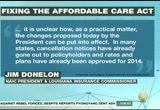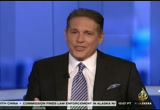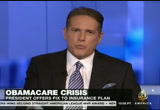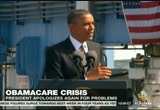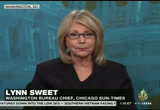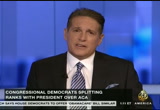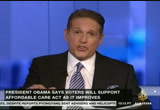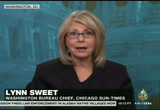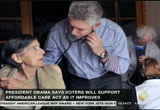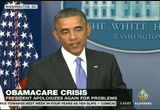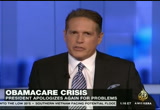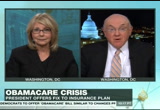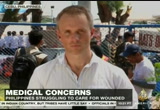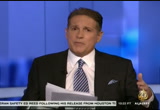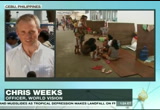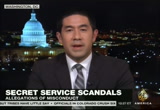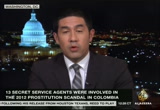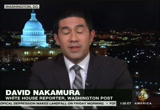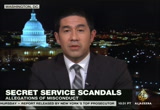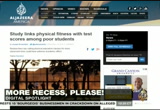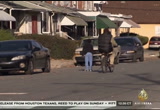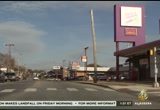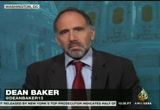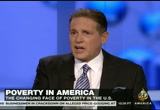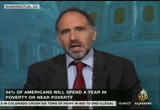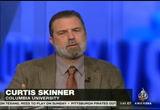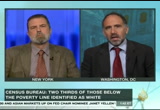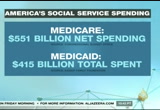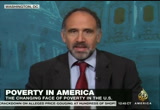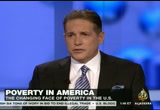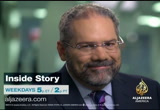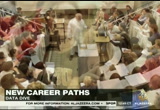tv Consider This Al Jazeera November 15, 2013 1:00am-2:01am EST
1:00 am
>> welcome to al jazeera america. here are the top stories at this hour. >> the president's heath care plan is getting a makeover of sorts to allow people to keet insurance plans through next year. john boehner says the only way to fix it is to get rid of it. >> it's been a week since typhoon haiyan hit the philippines. more than 4400 are dead. hundreds of thousands are waiting for food, water and medicine. >> u.s.s. "george washington" arrived thursday, it's part of a large navy fleet bringing supplies to the region. investors were happy with what they herd from federal reserve
1:01 am
nominee janet yellen. a vote on her nom nation could come next week. >> whitey bulger was sentenced thursday to two life sentences in prison plus five years. an attorney says he plans to appeal. he was found guilty of murdering 11 people and convicted of a string of other charges, including extortion and money laundering. >> federal officers in denver destroyed 6 tonnes of ivory, they wanted to send a message. those are the headlines - "consider this" is next on al jazeera. . the president promising fixes on his troubled health
1:02 am
care plan, "consider this" - the white house, if they can't get it right in 3.5 years, will another year make is different? america's long-held believes about the poor are wrong. they are white and more suburban by the day. what's in a - spray. a spending spree at auctions have jaws dropping. are they good investments. >> i'm antonio mora, we begin with obamacare. most americans believe the president broke his word when he promised they could keep doctors and health insurance plans only to see the insurance companies cancel policies. the president offered new rules allowing people whose policies were cancelled to get them back. he offered another round of apologies for obamacare's problems, which failed to move the speaker of the house.
1:03 am
>> i did not have enough awareness about the problems with the website. even a week into it. the thinking was these would be fixed with patches. with respect to the pledge i made about if you like your plan you can keep it. there's no doubt the way i put that forward unequivocally ended up not being accurate. those that got cancellation notices deserve and have received an apology from me. they don't want words, they want whether we can make sure that they are in a better place when we made that commitment. >> no one could identify anything the president could do it administratively to keep the pledge. let's be clear, the only way to fully help the american people is to scrap this law >> for more on what the president's new rules would mean
1:04 am
on anyone that lost their shirns, i'm joined by emily ethridge, health care staff writer with roll call. the president's new plans, insurance commissioner said: >> along with being the mess is bandaid? >> it's not a band aid, but it's a difficult thing for insurance companies and commissioners to figure out. they have six weeks left in the year to scramble and put the policies back together. they have decided it may not happen this year or maybe next year. it's a lift - paperwork wise, administratively, it will be difficult to make this happen. >> one of the other issues that john boehner raised is that obamacare can't be fixed with an administrative action by the president. does it require legislation. now.
1:05 am
>> we are going to see the house vote tomorrow on election that would allow people to keep their plans, similar to the obamacare plan. it would let everyone buy the plans. the democrats introduced legislation with a similar goal. there's a lot of people in congress that say it's up to the lawmakers, congress, that president barack obama doesn't have the authority to name this happen and he won't enforce the own law that he wrote. >> if the rules goes into effect is it just kicking the can down the road a year, because the insurance companies could cancel the policies next year and you'd be back to square one. >> right. we'll be in the same situation next year. people will have had a year's warning, but people had warning leading up to this year. i don't think more time to
1:06 am
prepare is what the consumers are looking for. again, under the president's plan, if it took effect, they'd be in the same situation, next thing. >> you mentioned the push back from the insurance companies. public officials, the insurance commissioner in kansas. others say it can't be done. jim donno lan, the president of the national association of insurance commissioners and louisiana - these are public officials, not insurance companies and they are saying: >> i guess the question is what happens to the people who had their policies cancelled, if their old insurance companies decide they can't or won't offer the policies they dropped. >> the people will be in the same position they are in now.
1:07 am
in order to keep your plan next year, if the president's plan happens the insurance company has to despite whether to offer the plan. insurance commissioners will have to approve it. then people have to be notified that the plan was cancelled, but not any more, it's resurrected and they'd have to enrol in the plan. all that has to happen before 2014. we are working on a short time frame here. if that will help millions of americans, that would be a lot time. >> confusion in louisiana. the insurance commissioner joim donno lan, but the diplomatic senator said something else saying: >> we have heard a democratic
1:08 am
insurance commissioner in the united states saying they can't do it. does it seem the senator by be president. >> i think she's optimistic. she wants it fixed and changed. she has her own bill that allows the plans to continue to be sold indefinitely. she - she's in a tough spot. she faces a tough re-election campaign and is trying to look for a way for the problem to be solve. she will be hopeful that people will do what the president wants. if they want to do what the president says, it's hard to do. >> the bigger question is whether the president may sabotage his achievement by undermining his own policy. pushing it off for a year may mean young people may not be involved, the money from those
1:09 am
people buying the policies comes out of obamacare, and doesn't it need the money to pay for pre-existing conditions, to pay for people's subsidies. >> well it's important to get the balance of people in the exchanges in the insurance market where you have the young healthy people, older people that need care, and a whole range of them so that you have a mix. it's not just elderly and sick people who need insurance, and bring the costs up. this might mess with that for next year. one thing - insurance are worried about, and you heard president obama say one of the reasons he passed the law was so people could have quality good health care coverage, other than what they have now with consumer protections and benefits they don't have now. now he's saying, "you don't want them, you don't have to have it for a year, even though it's good for you and it would be
1:10 am
better, you guys are not spineless" - you know... >> another day in washington. thank you for joining us, emily ethridge. now we switch to the physical fall-out. we are joined by lynn sweet, the washington bureau chief for the "chicago sun-times," and bill schneider, our contributor, professor at george mason university and distinguished fellow and resident scolar at the think tank third way. will the president's speech change minds. will we have two competing proposals - obamacare - one in the house and one in the senate. >> the news conference was the point on the hill. it's the temporary fix that barack obama is offering that democrats wanted to know about. now, republicans are against obamacare - they are rooting for it to fail.
1:11 am
really, with the vote friday, it's a test vote on the bill to see how many democrats have to vote for it. obama will have kept some democrats off it, offering an alternative, which is why the bill was timeded today. the press conference where he was contried, that is for political -- contrite, that is for political cover and to calm nerves. the democrats who were so angry at him on this, they want to know is the temporary fix something that can work, can address this big mess of people who unexpectedly are getting notices that their policies are not going to be renewed. >> as lynn said and you told us, dents democrats are angry, recollection.
1:12 am
>> the reaction in washington was cynic al. the voters - he didn't hurt himself because he signalled he was listening. it was the press - the president says - the things that go write you guys will not write about, the things that go wrong get prominent attention. with that the press went off on a tear with the president. that can't be good. >> there are polls showing that the huge disadvantage that the republicans had with - in the generic polls, when it comes to putting a generic republican and a generic democrat in the 2014 election, the democrats had a 9-point advantage. now polls show them even or the republicans ahead. there's a problem. >> they do have a problem. part of it is disillusionment with the health care plan which lost support in the last few
1:13 am
weeks since it was brought out. also the economy. the president will talk about the economy in the next few days. people are losing confidence that there is an economic recovery out there. retailers are worried about the christmas season. >> the fondness for ports anaing ergeies are on -- anal ergeies that. >> it's a big game, the game is not over. >> a piece on forbes.com said the game was over, obamacare may be repealed. what do you think? >> it's ridiculous, barack obama wields the veto pen and the senate is controlled by democrats. it will not be repealed. can it be changed? ? obama said
1:14 am
it would. what obama did with the temporary fix is he bought time to try to make this work. for all the people that may be disillusioned, if the health care site is up and running, you have uninsured people - they'll start to get coverage who had not got it. there would be pre-existing conditions not covered. there'll be people benefitting from this. if obama can weather the period of the self-imposed crisis by his bad management of the roll out, i would say it is way, way, way premature to look at the long term prognosis for this heath care plan. >> do you agree that the benefits
1:15 am
people feel will win the day. >> that's what he meant. no more exclusions for people with pre-existing conditions. those are extremely popular. his plea was why does the press give more attention to those things and interview people about how they feel about that. >> the president took time to apologise to a key constituency, democrats. >> our failure to roll out the aca smoothly has put a burden on-democrats, whether they are running or not. we'll do better every day until it's done. >> was that a promise or a threat? >> well, it is a promise what
1:16 am
you make of it, it seems if he wants to help democrats, those who are in marginal swing districts, they feel they'll have to take a hit over this. we'll see it soon. will he do more fundraising. he's at a fundraiser tonight. i think he will have to do more to help the people stay in office. one thing that could help tomorrow, if this upton bill gets there - let everyone who needs to vote, vote against him, because it could be a meaningless vote. i think the roll call tomorrow will be interesting >> they can claim they voted against some of the issues with the plan. a final question, bill - we are talking about the endangered democrats. the national republican congressional committee uniformed over the obamacare supporters, putting out an email targetting new york congressman steve israel and is read:
1:17 am
>> was that a warning shot across the bow not just for red state democrats, but blue state democrats that they will be tarred with obamacare? >> yes, republicans have a strategy. john boehner announced the strategy after the end of the shutdown and when he spoke to the republican caucus. he said, "remember our strategy for stopping obamacare - it is tarted legislative strikes aimed at shattering the legislative coalition that the president used to force this law on the nation. namely what they want to do is split the democrats. they want to have democrats cowering in terror over having to run next year with a burden of defending the law, and the expectation is a lot of democrats will defect and the
1:18 am
upton bill will pass the house. the danger is it could pass the senate. the president will veto it, it could be a situation with the democratic coalition shattered to pieces. that is the republican strategy. >> more than 3.5 years later after this was signed into law we are still discussing it. >> coming up we take you to the philippines as the region has gone from surviving the disas ter to illness. and also scandal and what it means for the force and we track the top stories on the web. what is trending. >> a lot of kids will be happy to hear this - recess is good for your grades. what do you think, join the conversation on facebook, twitter and our google+
1:21 am
a race to help hundreds of thousands sick, hungry and devastated by the typhoon, doctors working in dreadful conditions fear they'll treat serious cases of pneumonia, diarrhoea et cetera. one doctor stood in a line of people seeking help. >> we have amputes there in a wheelchair. we have children. arm. even the hospitals here have shut down. >> turning to the latest is chris weeks, an officer at world vision, an organization that works in hundreds of countries, they have been working in cebu, distributing aid.
1:22 am
11.5 million have been affected. what are you seeing? >> certainly we have seen few of the 11.5 million access this incredibly difficult area. yesterday we sent a convoy of trucks to the mountains north of cebu city. we delivered aid to 750 families, and the need there was incredibly great. to put it simply, people were running out of food. the aid reached them in time >> so much of the focus has been on tacloban, because it was the biggest city devastated, but problems are all over the place. relief is coming into cebu all over the world. it's a logistics hub, hospitals are overwhelmed - the ones standing, and many people are travelling to cebu for help. what is the state of the hospitals? >> i have heard that power has been restored to some of the hospitals. that's good news. getting people around - this is
1:23 am
a central island. the typhoon swept from right to left across the belt of islands in the middle of the philippines leaving a trail of destruction. it's difficult in some places to get around. we went to remote places. i saw a bit of that, some of the roads crumbling away, stretcherous hillsides. getting there is a challenge. >> medicine is a challenge. little kids are drinking whatever water they find under terrible circumstances. how big of a concern is there about a bigger medical crisis that might be building? >> it's a very large concern, and the fact is that people - if they drink unsafe water, if they are in cramped evacuation shelters - many people have lost their homes and everything they owned. the shelters that they run to to escape the weather, the 200
1:24 am
miles per hour are the places they are still living in. the terribly cramped conditions can lead to very serious health concerns. we need to do - as we have done with the major drop yesterday is get clean drinking water and food. there's more to do, they need to build on that. >> there's a desperate need for communications in order to coordinate the effort. >> things are getting better. i remember a few days ago, the first few days of this unfolding, we couldn't get hold of our staff, and the staff their families. infrastructure is a major problem. where i was yesterday, there were mobile phones, but no signal in the mountains. many of those have yet to be restored. when they are, that is going to make things easier. >> to coordinate things.
1:25 am
have you seen anything as bad as this? >> no is the own to that. this is an historic weather event. people in the philippines are no stranger to severe weather. they see 20 of extreme things a year. speaking to people, this took them by surprise. there was a warning, our charity world vision was among the agency and the local government warning people to take cover. people went into evacuation shelters. but they were evacuated. this was so severe, and the devastation it left - families i met yesterday - it will take people years, some people financially in a lifetime will never recover. >> chris weeks, thank you for your time. we wish you and world vision the best in your efforts. >> two secret service agents have been kicked off president obama's security detail after allegations of misconduct. the situation begone with a
1:26 am
bullet left goodnight at a hotel steps away from a white house. a former agent wrote a tell-all book about his days guarding the president. joining me is david nakamura, a reporter who broke the story for "the washington post." great to have you with us. what happened. one agent was allegedly found trying to re-enter a woman's room at the hay adams after room. >> this happened last may. what happened was an off-duty supervisor in the elite presidential subdivision, the most elite division responsible for president obama's personal security was off duty when he went to the hotel across the street. he met a woman joined her and left a service bullet in the room by mistake. he returned - if you return to the secret service without equipment you are in trouble. he tried to re-enter the room.
1:27 am
hotel security intervened. he identified himself as an agent, and the service took a broader look at what was going on after being nodified. the senior supervisor had engaged in inappropriate emails with a subordinate and another supervisor also had been exchanging emails with this subordinate herself. this caused head aches and embarrassment for the agency. >> makes me wonder why he had a bullet out in a room at hay adams with someone he didn't know well. it triggers an investigation and the guys were supervisors. one a senior supervisor. >> absolutely. the most senior had been in the agency for a couple of decades, worked in the head of the mexico city, and been n the detail of laura bush as the first lady,
1:28 am
and she mentioned him in the wake of 9/11 he was an agent she relied on to keep her safe. he has a good reputation. yet something like this, coming out like this raises a broader question. both of these men, again, worked a lopping time to get to the detail. you are not just put on this. we remember the scandal. some were younger agents, post-standers, broader, but these were inside the washington d.c. office. the fact that he had a gun, we have to understand the reason he left a bullet was he was trying to show that she was secure. he was trying to sort of secure the weapon, and in doing so you remove a bullet, which is normal. what is not normal is that it dropped to the ground and didn't realise. the inspector general is aware of this, they are doing a
1:29 am
broader cultural review. >> let's talk about the other thing. former secret service agent dan - i don't know the pronunciation - who wrote a book been president obama - he protected the president. this is a gossipy book. he's letting out all sorts of information, being negative about the obamas, calling it toxic. aren't these people supposed to be really trusted agents and people you have every bit of confidence in? >> absolutely. they consider themselves the 1% of the 1% n world of law enforcement. not sufficient physical, but mental ability. i have talked to dan. his brother was one of the people indicated in the cart her-hayner scandal. he is running for illan. he is accused of being an
1:30 am
attention seeker. >> major republicans say, "don't buy the book, it's not cool to have a secret service agent gossiping about the president", when you trust someone with your life, the don't expect them to turn around and do this. remember the carter-hayn, r, the night of partying and hiring prostitutes, he made jokes about sara pailin showing pictures of him standing behind her. this is again what the cultural review is looking at. it's a one-time incident, not part of a culture." people we talk to suggest opposite. a senator said he's aware of more incidents. >> this is the elite, the people we see as the ones willing to take a bullet for the president. at a hearing on thursday, senator ron johnson asked about the
1:31 am
report on the profit tuition scandal that -- profit tuition scandal and congress found similar incidents in 17 other countries says johnson. bad behaviour that involved prostitutes. again, it doesn't seem to be an isolated issue. >> it doesn't. last year we heard of other incidents on the road, not even on the presidential trips, but the secret service protects other dignitaries. we heard other rumours. the inspector general is doing a broader review they have been working on for a year. we have been told that ig is not necessarily aware of the incidents that the senate committee heard of. stories should come up on "news story", we talked to a former folk involved with the other incidents, aware of them, and talked to the senate committee. the person is talking to us.
1:32 am
we know who it is, we are not protecting the identity. this person told us about other incidents. again, whatever the ig report harks the senate committee may come out with their own investigation or some of the things they learned in hearings and other things. now the service is trying to get over this. they are dealing with budget cuts and other topics that they prefer to deal with. >> and they have made changes and changed the rules and put a woman in charge of the secret service. we'll see what happens here going forward. david nakamura, from "the washington post," appreciate you joining us. >> time to see what is trending on the website. >> because of an emphasis on test scores many schools cut down on recess. al jazeera america contributor joe brown reports on research linking physical fitness to better test scores among high poverty children. 87,000 public school student were tracked from 2006 to 2010
1:33 am
if asking from agreed 6 to 8. boys and girls from high poverty homes who are physically active receive better test scores. new york city health department stays they hope the study will bring a message about the importance to physical fitness saying: now to your reaction: read more at the website aljazeera.com >> it's a problem, dropping recess, pe. it's an issue. kids need more activities. >> more recess. >> we all need more recess. straight ahead - poverty in america goes suburban the shifting stats on america's poor. do your college courses not make
1:34 am
a major distance. >> every morning from 5 to 9am al jazeera america brings you more us and global news than any other american news channel. find out what happened and what to expect. >> start every morning, every day, 5am to 9 eastern with al jazeera america. the stream is uniquely interactive television. in fact, we depend on you, your ideas, your concerns. >> all these folks are making a whole lot of money. >> you are one of the voices of this show. >> i think you've offended everyone with that kathy. >> hold on, there's some room to offend people, i'm here. >> we have a right to know what's in our food and monsanto do not have the right to hide it from us. >> so join the conversation and make it your own. >> watch the stream. >> and join the conversation online @ajamstream.
1:35 am
>> has american poverty gone mainstream. four out of five adults in the u.s. will experience unemployment, poverty conditions and rely on welfare at some point in their lives. poverty is hitting some in the suburbs hard. 15 million suburban items are living in poverty. chester pennsylvania are a case study, they lost a pipeline when the shipyards closed and the main source of income disappeared. 13% of residents are unemployed, one in three live in poverty. even getting a healthy food has been a struggle. >> chester has not had a supermarket since the last one closed 12 years ago. until now. fair and square, a nonprofit store in the nation opened two months ago. >> we need it. babies need it.
1:36 am
the elderly need it. they need to eat properly. >> half of chester's residents don't have access to a car. a trip for groceries involved buses. >> there wasn't anywhere in the city of chester where you could get lettuce. nonprofit grocery stores could be a new model. >> we used charitable dollars and government dollars to build it out. i don't have real estate costs. i don't have a rent or mortgage payment. that helps to keep costs low. >> while 60% of the shoppers receive food stamps, shoppers in need are ellagible for a 7% credit every time they make a purchase. the store provides employment. more than 80% of its workers live in chester. the store provides access to social services. >> we are negotiating with some of the health providers for dental screening and prenatal screening.
1:37 am
we have plans in the works to do nutritional education and a cooking school. >> the goal of supermarket was to provide easy action to school for a community in need. shoppers tell me that they feel safe shopping here. >> lisa hall helps her goddaughter take care of her three children. >> the most important thing is they are safe. you don't have to worry about being robbed. they have plenty of security. >> chester's crime rate is almost three times higher than the average, schools ranking as some of the worse. the store is hoped to be maybe renewal. >> a community of this size without a supermarket says something about the decay of the community. the arriving of one says something about their resurgens. >> let's bring in dean baker, the co-director of the center
1:38 am
for economic and policy research, and curtis skinner is the director of family and economic university program at columbia commufrty. dean, as we saw the american dream seems cut off from a major segment of the population, it's not just inner city poverty, but we are seeing this in cities suburbs. >> chester pennsylvania, i went to school there. they have been hit by that for a long time. it's an area long victimized. part of the story is remnants - the ongoing story of the economic downturn. we are far from recovered from it. we saw the hit in 2008. the economy was better than in 2009/2010. we still have high unemployment, wages have gone nowhere, so we have populations that are hard-hit for long periods of time. it's been
1:39 am
amplified by the knolent of the economic downturn which doesn't show a sign of having gone away. >> is it worse now than in the past. if you look at the numbers from a pure percentage standpoint. it seems we are at the same numbers as we were when we hit the recession in the early "90s and the '80s. >> in terms of child poverty, which is what we look at, child poverty rates are high. they are 22%, they held up at that percentage since 2010. the child poverty rate is down 16% in the year 2000. it's a high rate. the same for people as a whole. a 15% rate. >> 50% was the same historically high rate in the early '80s. >> actually in the early "90s there was high poverty rates reaching the level.
1:40 am
during the booming economy of fell. >> dean, it is a growing suburban issue. all these misconceptions about poverty, you think about poverty, inner city, and there's a higher rate of poverty in the cities. currently there's more people living in the suburbs than in the inner cities. >> i think this is the flip side. you have a lot of cities in dc. you have middle class, upper middle class people moving into the cities, revitalising areas, people with money. these are places becoming upscale. what they have done is push the populations who used to live there in the suburbs, the inner ring suburbs that used to be occupied by middle class families. a lot of those have been taken over by families that often don't have work lower down the
1:41 am
income ladder, and part of the story is that people that used to be middle income lost their jobs, and they are living near the poverty line. >> that brings up a dynamic nature of poverty, which some found while the fms are as stonishing as to how often every american will be near the poverty line. we have members saying four out of five people will need welfare or unemployment - numbers are shocking as to how many of us will need assistance at some point in our lives. >> yes, it's really quite compelling data. you see how mainstream it is in this country, despite the average standard of living, that people cycle in and out. they can be brief, but a lot of families cycle repeatedly in and out of poverty. you have a sector of families in
1:42 am
intense prolonged poverty, people living in dense poverty, and families in extreme poverty, below 50% are apt to experience prolonged periods of poverty. it speaks to the importance of the safety net. the image that poverty is for a marnalinialized population is not a true story. >> two-thirds of people in poverty are white. >> that's right. a higher percentage of african, higher percentage of his panics are in poverty, but the bulk of the people will be white. people racially stereotyping, that doesn't fit. the point about the safety net. that is what we want to see, that the percentage of people hard core poverty and there are some in that boat. most of the people in and out of poverty, that is what you want
1:43 am
to see from the safety net programs, that people have troubled spells, they lose a job, family break up, an illness, and you have safety net programs supporting them through that time and they are back on their feet, working. that's what you want to see. i'd like to see more generous programs. for the most part the people in poverty are not hard corp. >> you don't have the poverty that changes, or not as much as we are led to believe. curtis, what about the fact - are we not spending money properly when it comes to the safety programs. europe. the average rate of poef erty in europe is half of what -- poverty in europe is half of what it is in the united states. the money we spend on programs has grown dramatically. >> if you look at the spending percentages and break them down with federal and state, not a
1:44 am
lot of funny is spent on safety net programs, if you exclude the programs intended for the elderly. social security and medicare. that's where a lot of spending goes. there has been recent studies showing that was declined as a personnel of tral spending. i think a cover story in a major national magazine emphasise the point that 10% of federal spending goes to children and children's programs. some of these discretionary safety net programs are not terribly expensive. medicaid is the exception, it is important and relatively constant program and is effective. if you make a cost benefit analysis of what medicade contribute as opposed to what we have in terms of emergency room visits and untreated illnesses that are worse from lack of having a safety net program, i'd
1:45 am
like to see that accounting. i suspect medicaid saves us. >> how important is the changing face of america, in determining how the dollars are spent and moving problem? >> there's two sides to this. one is the before tax side - what can we do to get people into jobs, decent paying jobs. that's the immediate problem. that's why the poverty rate has been rising, the unemployment rate has gone up, workers are working for low wages. that we have to understand. how do we get the economy going. people in washington are reluctant to take the steps. i know it's not popular. people are scared about budget deficits. they are the big numbers. people who don't want budget deficits don't want jobs. the other part are the programs, the - like the food stamp programs, effective, in terms of improving nutritional levels,
1:46 am
with programs like women, infant and nutrition. important for young, you know, babies, children in poor families. cheep, actually. we are talking about a program that cast - id i would have to do the calculation, one-tenth, of the budget. people are reluctant. we have to - as i say, i focus on the former, what we could do in terms of before tax. we did an important job of provide gs decent paying jobs to people. we can do more on the other side, the transfer programs, particularly transfer programs benefitting young children. >> tens of millions are affected by this. as both of you said, a lot of young children. it's an important topic, something that needs to be focused on. appreciate you taking the time for talking to us. >> from the poor in the america to the ultra rich.
1:47 am
it's been a few good weeks for auction houses raking in nearly $2 billion in the last 10 days with record sales on everything - from paintings to diamonds. what is behind the boom? >> start with one issue education... gun control... the gap between rich and poor... job creation... climate change... tax cuts... the economy... iran... healthcare... it goes on and on... ad guests on all sides of the debate. and a host willing to ask the tough questions and you'll get... the inside story theses are strait forward conversations, no agenda, just hard hitting debate on the issues that matter to you ray suarez hosts inside story only on al jazeera america determining using some sort of subjective interpretation of their policy as to whether or not your particular report was actually abusive, because if it doesn't contain language that
1:48 am
specifically threatens you directly or is targeted towards you specifically, they may not consider it abuse. they may consider it offensive. and in that case they just recommend that you block that person. >> i don't want to minimise this, because i mean, there's some really horrible things that are on line, and it's not - it's not just twitter, what has happened through social media and the anonymity of the net is that you see websites, hate-filled websites targetting all sorts of groups, popping up. there has been a huge number of those that exist as well.
1:49 am
1:50 am
demand for workers and industries change a lot, even in four short years it takes for undergrads to get degrees. the housing collapse led to higher unemployment for architecture grabs. george town researchers found they had the highest jobless levels of any major, followed by people with degrees in the art. demand for people with health care rose. the difference between what you study in college and what you do for a living results from the fact we can't seem to sit still. a study by baby boomers found younger boomers held an observing of 11 jobs by the time they were 46. the amount of time an average worker stays in a job is only around four years. i'm an example - i went to law school, look where ieneded up. >> coming up high price
1:51 am
2:00 am
. . . president obama admits he fumbled the rollout of the affordable care act and announces a plan for americans to keep insurance policies cancelled under the law >> some victims of typhoon haiyan are begging for help a week after the storm. >> a reality tv show for the mayor of toronto, the plot twist for rob forrd. >> in chicago - hundreds show up hoping to try out for the new star wars
72 Views
Uploaded by TV Archive on

 Live Music Archive
Live Music Archive Librivox Free Audio
Librivox Free Audio Metropolitan Museum
Metropolitan Museum Cleveland Museum of Art
Cleveland Museum of Art Internet Arcade
Internet Arcade Console Living Room
Console Living Room Books to Borrow
Books to Borrow Open Library
Open Library TV News
TV News Understanding 9/11
Understanding 9/11






